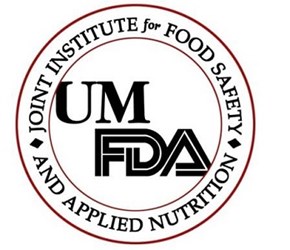JIFSAN — Growing Food Safety Partnerships Worldwide
By Laurel Maloy, contributing writer, Food Online

The U.S. imports almost 70 thousand metric tons of edible products each year, the equivalent of over 154 million pounds of food. The FDA alone cannot be expected to ensure all that imported food is safe; the agency needs some help
The volume of imported foodstuffs to the U.S. may have fallen in four of the last five years, but the numbers are still staggering, and have doubled in the years spanning 1999 to 2013. As Americans clamor for more exotic, interesting, and healthy food choices, American farmers are unable to produce the large amount of foods needed to feed our country. The upward trend of imported food volume is expected to continue into perpetuity.
Now, think about what it takes to monitor the safety of that enormous amount of food. Much of it is unprocessed or raw, with about one-third of the volume being fresh fruits and vegetables. It is estimated that only about 2 percent of the United States’ imported food is actually inspected as it reaches our shores. FSMA’s Third-Party Certification and the Voluntary Qualified Importer Program will certainly help. However, the FDA is just one government agency and cannot be expected to ensure the safety of all imported food.
The Reality Of FSMA: Is Your Business Prepared?
Just as the two previously mentioned FDA programs are designed to identify food contamination at the source, so is the Joint Institute for Food Safety and Applied Nutrition (JIFSAN) — a somewhat silent and not widely-known, though not insignificant, FDA partner. Based at the University of Maryland (UM), the jointly administered program has a vision, “To be a premier source of scientific information and education programs on food safety and applied nutrition that enables the development of sound public health policy and reduces the incidence of food-related illness.” What the vision statement doesn’t say is outlined in its strategies, where sustainable global relationships and expanding global capacity building in food safety is highlighted.
JIFSAN is responsible for furthering an international network of food-safety training laboratories in order to raise the standards of global food safety training and testing. The first International Food Safety Training Laboratory (IFSTL) was launched in Sept of 2011; a collaborative effort involving the FDA, UM, and Waters Corp. — an analytical technologies company. The second IFSTL in the U.S. was opened in Jan of 2013, near New York City, a joint venture between Waters and The Food and Environment Research Agency (FERA). FERA is based in the U.K. and has a century’s worth of scientific solutions in the areas of food quality and safety, agro-technology research, detection, and surveillance technologies. The Fera IFSTL will focus on training scientists concerned with U.S. exports to Europe. Upon its formal opening, Lord de Mauley, Parliamentary Under-Secretary of State (Lords), said, “It’s very encouraging to see the public and private sectors working together to facilitate trade from outside the EU. This will improve food safety testing for food imported into the EU; ensuring food is safe before it reaches our tables.” Concern for global food safety goes both ways.
Achieving Global Certification In Food Safety & Quality
JIFSAN also maintains FoodRisk.org and offers educational opportunities to food safety risk analysis professionals worldwide. JIFSAN, employing only 20 full-time people, is an expert when it comes to collaboration. The agency supports the FDA and UM faculty members, but also reaches out to other universities when a research need cannot be fulfilled within its own or the FDA’s facilities. JIFSAN is currently involved in developing a training program for whole-genome testing, expected to be the next major breakthrough in identifying and tracing back foodborne pathogens. The organization also recognizes the need to “train-the-trainer” in countries around the world, this model providing the largest successes. JIFSAN is striving, and succeeding, at making the global food import/export environment safer, by engendering partnerships where none once existed.
